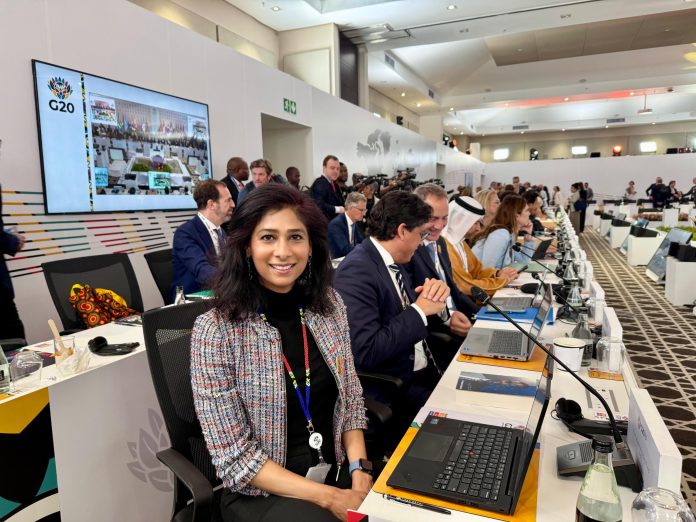Amid tariff wars initiated by the US, 1st Dy MD Gita Gopinath says policymakers should focus on resolving trade tensions and implementing macroeconomic policies
KWAZULU-NATAL, South Africa – July 18 (The CONNECT)- Amid tariff wars, the International Monetary Fund today said downside risks continue to dominate the global economic outlook with C.
Addressing the third meeting of the G20 Finance Ministers and Central Bank Governors here, First Deputy Managing Director Gita Gopinath said, “while we will update our global forecast at the end of July, downside risks continue to dominate the outlook and uncertainty remains high”.
Since April, economic indicators have been reflecting a complex backdrop shaped by trade tensions, Gopinath said ad observed “we have seen strong evidence of front-loading ahead of tariff increases and some trade diversion”. There has also seen an improvement in global financial conditions as select trade deals lowered average tariffs while cooling demand and falling energy prices point to a continued decline in global inflation, albeit with variation across countries, she said.
IMF’s April world economic outlook forecast projected global growth of 2.8 percent in 2025 and 3.0 percent in 2026, well below the historical average of 3.7 percent. This included significant downgrades to major economies such as the U.S. and China, owing to greater policy uncertainty, trade tensions, and softer demand momentum. Global headline inflation was projected to decline, but at a slower pace, reaching 4.3 percent in 2025 and 3.6 percent in 2026, she said.
Even though financial conditions have eased since April, with trade and geopolitical uncertainty still elevated, financial stability risks remain in focus, she said.
Asset valuations are once again stretched, the use of leverage remains high in parts of the financial system, and periodic pressure observed on government bond yields and market functioning carries the risk of broad repercussions, particularly against a backdrop of large fiscal deficits and increased illiquidity.

Vigilant surveillance and robust supervision remain paramount and recent progress in financial sector oversight must continue, particularly for NBFIs which now account for more than 50 percent of the financial sector, she pointed out.
Improving cross-border payments systems, including through new financial technologies, can help boost growth and strengthen macro-financial stability, she opined.
Against this backdrop, Gopinath observed, policymakers should focus on resolving trade tensions and implementing macroeconomic policies to address underlying domestic imbalances.
This includes restoring fiscal space and ensuring debt is on a sustainable path, she said and stressed the need to maintain price and financial stability, can careful calibration of monetary policies to country-specific circumstances and use clear and consistent communications.
Observing that central bank independence must be protected, she said structural reforms remain essential to lift medium-term growth and offset demographic shifts, by boosting productivity, supporting job creation, and leveraging new technologies.
“The IMF welcomes the renewed focus on domestic revenue mobilization, which is indispensable for strengthening public finances and helping countries, especially here in Africa, to achieve development goals. Our analysis suggests that Low-Income Countries could raise an additional 7 percent of GDP if they achieved their estimated tax potential,” she said.
IMF supports a “stronger focus” on public spending efficiency, which is vital for investing in sustainable development within tight fiscal constraints. The IMF is helping through governance diagnostics, macro-fiscal framework design, and improvements to public investment management and the management of state-owned enterprises, Gopinath said.
To lower the cost of capital and attract private investment, she said, the work starts at home with domestic reforms. The IMF recognizes that some countries, whose debt is sustainable but currently face high debt service costs, may need a pathway to help them create fiscal space until the benefits of reform take effect.




